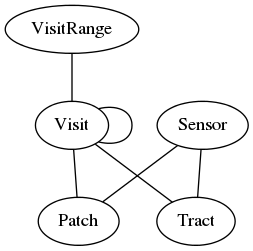DataUnit Joins¶
The tables (which of course may be views) in this section define many-to-many joins between DataUnits. Each consists of only the (compound) primary key fields of the tables being joined.
These join tables have no direct representation in Python, though the connections they define appear in a DataUnitMap.
The following direct connections exist:

Calibration-Observation Joins¶
VisitRangeJoin¶
- Fields:
visit_begin int NOT NULL visit_end int NOT NULL visit_number int NOT NULL camera_name varchar NOT NULL - Foreign Keys:
- (visit_begin, visit_end, camera_name) references VisitRange (visit_begin, visit_end, camera_name)
- (visit_number, camera_name) references Visit (visit_number, camera_name)
Whether the VisitRangeJoin table is calculated is TBD; it could be considered the source of truth (overriding the ranges in the VisitRange table).
If this table is calculated, it can be defined with the following view:
CREATE VIEW VisitRangeJoin AS
SELECT
VisitRange.visit_begin AS visit_begin,
VisitRange.visit_end AS visit_end,
Visit.visit_number AS visit_number,
Visit.camera_name AS camera_name
FROM
Visit INNER JOIN VisitRange ON (
Visit.camera_name == VisitRange.camera_name
AND
Visit.visit_number >= VisitRange.visit_begin
AND (
Visit.visit_number < VisitRange.visit_end
OR
VisitRange.visit_end < 0
)
);
VisitSelfJoin¶
Visits can be joined to Visits from other Cameras primarily to represent simultaneous observations taken for calibration purposes:
- matching Collimated Beam Projector (CBP) configuration states to main-camera observations of the CBP;
- matching CBP spectrograph observations to CBP configuration states.
This join table will probably only be used indirectly to relate auxilliary telescope observations with main camera observations, because that mapping may involve a spatial component as well. Instead, we expect to aggregate all reduced auxilliary telescope observations for a night into a single Dataset that is associated with a VisitRange for the night; these are then related to raw science exposures by the VisitRangeJoin table and interpolated temporally and spatially by science code.
Spatial Joins¶
The spatial join tables below are calculated from the region fields in the tables they join, and may all be implemented as views if those calculations can be done within the database efficiently.
All but SensorPatchJoin may be implemented as views against it, but it may be more efficient to materialize all of them.
SensorPatchJoin¶
- Fields:
visit_number int NOT NULL physical_sensor_number int NOT NULL camera_name varchar NOT NULL tract_number int NOT NULL patch_index int NOT NULL skymap_name varchar NOT NULL - Foreign Keys:
- (visit_number, physical_sensor_number, camera_name) references ObservedSensor (visit_number, physical_sensor_number, camera_name)
- (tract_number, patch_index, skymap_name) references Patch (tract_number, patch_index, skymap_name)
SensorTractJoin¶
- Fields:
visit_number int NOT NULL physical_sensor_number int NOT NULL camera_name varchar NOT NULL tract_number int NOT NULL skymap_name varchar NOT NULL - Foreign Keys:
- (visit_number, physical_sensor_number, camera_name) references ObservedSensor (visit_number, physical_sensor_number, camera_name)
- (tract_number, skymap_name) references Tract (tract_number, skymap_name)
May be implemented as:
CREATE VIEW SensorTractJoin AS
SELECT DISTINCT
visit_number,
physical_sensor_number,
camera_name,
tract_number,
skymap_name
FROM
SensorPatchJoin;
VisitPatchJoin¶
- Fields:
visit_number int NOT NULL camera_name varchar NOT NULL tract_number int NOT NULL patch_index int NOT NULL skymap_name varchar NOT NULL - Foreign Keys:
May be implemented as:
CREATE VIEW VisitPatchJoin AS
SELECT DISTINCT
visit_number,
camera_name,
tract_number,
patch_index,
skymap_name
FROM
SensorPatchJoin;
VisitTractJoin¶
- Fields:
visit_number int NOT NULL camera_name varchar NOT NULL tract_number int NOT NULL skymap_name varchar NOT NULL - Foreign Keys:
May be implemented as:
CREATE VIEW VisitTractJoin AS
SELECT DISTINCT
visit_number,
camera_name,
tract_number,
skymap_name
FROM
SensorPatchJoin;